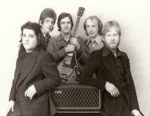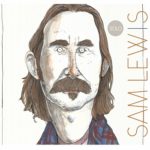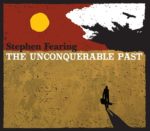 The first proper gig; it should be memorable, shouldn’t it? For some of us it’s the start of a lifetime of queuing in the rain twenty minutes after doors while the drummer gets his floor tom sound right, of missing the last train home and paying £60 for a cab and of explaining that you just spoke to the band’s manager twenty minutes ago and you are definitely on the guest list, besides the singer’s a mate of yours. All of those frustrations are forgotten when the sticks click and the band hits their groove (sorry anyone that doesn’t have a drummer, but you know what I mean).
The first proper gig; it should be memorable, shouldn’t it? For some of us it’s the start of a lifetime of queuing in the rain twenty minutes after doors while the drummer gets his floor tom sound right, of missing the last train home and paying £60 for a cab and of explaining that you just spoke to the band’s manager twenty minutes ago and you are definitely on the guest list, besides the singer’s a mate of yours. All of those frustrations are forgotten when the sticks click and the band hits their groove (sorry anyone that doesn’t have a drummer, but you know what I mean).
Do you remember the first time?
I certainly do, and I made a reference to it on this very website nearly eight years as part of an appreciation of the wonderful Nick Lowe. Here’s the unedited album version.
It was the East Midlands in the mid-seventies: a time of industrial unrest and political instability. The UK had been in the Common Market for a year and in the US, Nixon was living on stolen time (he resigned almost six months later). On Monday 25th February 1974, none of that mattered; I was going to my first proper gig, to see a proper band that I’d seen on the Whistle Test and had already released five albums. And they were playing at The Civic Theatre in Mansfield of all places. I’m pretty certain the sixth forms from all of Mansfield’s grammar schools were in the audience, after visiting the pubs with the most lenient bar staff. Fair to say there was a sense of expectation.
With hindsight, I can see that there wasn’t a huge budget for the tour and that support bands were picked up locally. It makes financial sense, and a local support will bring along some of their fans to swell the audience and that’s a good thing, yeah? The support band this time was a local rock covers band called Care, whose singer lived on the same estate as I did and who were popular with the local biker gang. Any alarm bells ringing yet? They played their set, got a great response from their own fans and were actually pretty convincing. So, after a quick break to top up the alcohol levels it was on to the night’s headliners.
By this stage, following the 1970 Fillmore hype and the bad feeling it generated with the rock press, Brinsley Schwarz as a band were back on creative form but commercially pretty much finished. They had some great tunes were a superb live band on their night. What they weren’t, crucially on this night, was a heavy rock band; you would colour them moody blue rather than deep purple. The majority of the audience had paid to see Brinsley Schwarz and were perfectly happy to hear their well-crafted and crisply-performed soul-inflected pop/rock. Not the leather-jacketed fans of the support band; from the opening of the set they bayed menacingly about the lack of red meat and thud and blunder. The natives were restless and hammered; not the best combination.
The inevitable happened a couple of songs in when Mansfield’s finest mild boys took advantage of the lack of security to invade the stage in protest at the lack of power chords and screaming vocals. Everything happened surprising quickly and suddenly the stage was engulfed in greasy leather. It looked like a fairly even match between rockers and roadies until one deluded delinquent took a lunge at Nick Lowe, who was sporting his Gibson EB bass; and then he wasn’t. The rocker was wearing the headstock of the bass in his mouth and nose and spitting blood and teeth. Game over; Brinsleys 1, Mofos 0, shortly followed by the ignominy of the rockers’ retreat and vaguely threatening noises.
The roadies went back to the day job, got the stage reset for the band and the gig went ahead as if nothing had happened. The band were on good form and did the business for the rest of the set and then everyone went home happy, apart from a few broken bikers. As first gigs go it was memorable; a bit of underage drinking, a support band with a lead singer that I knew, a full-scale stage invasion and a great set from a band that I really wanted to see. And it happened in Mansfield of all places; I didn’t think for a second that forty years later I would be watching Brinsley Schwarz (with Graham Parker) and Nick Lowe (with his band and Geraint Watkins) at gigs in London, but that’s the way it panned out. That first gig showed me a way out of a small provincial town and the events of that night still influence my life now.
As I mentioned at the beginning, I wrote briefly about that gig eight years ago and a couple of interesting things happened. Someone else who was at the gig contacted me via a website comment and we’ve met up for a couple of beers in London, then Ian Gomm, who was the guitar player in Brinsley Schwarz, contacted me to say that the band never actually knew why the stage invasion had happened and were a bit concerned about getting a kicking outside. Unlikely; the rockers had probably retreated to their base in the Midland Hotel to compare war stories and intimidate the under-age drinkers that hadn’t gone to the gig.
 There are a few people whose work always gets my attention; Sam Lewis is one of those. The first thing you need to know about Sam is that his voice is a phenomenon. He sounds great on the studio material but live he’s something else. His voice is equally convincing with soul, country and blues stylings and he writes a pretty good song as well. He’s been compared with the greats and he’s worked with quite a few of them as well. In a live setting he’s very laid-back, relaxed and happy to shoot the breeze between songs; the whole experience has the feel of someone doing something that he knows he’s really good at and doesn’t have to strain to get right in that environment.
There are a few people whose work always gets my attention; Sam Lewis is one of those. The first thing you need to know about Sam is that his voice is a phenomenon. He sounds great on the studio material but live he’s something else. His voice is equally convincing with soul, country and blues stylings and he writes a pretty good song as well. He’s been compared with the greats and he’s worked with quite a few of them as well. In a live setting he’s very laid-back, relaxed and happy to shoot the breeze between songs; the whole experience has the feel of someone doing something that he knows he’s really good at and doesn’t have to strain to get right in that environment.
The idea of a live album recorded on the floor at the famous Southern Ground studio has a certain logic to it. One voice and one guitar (plus good acoustics); there’s nowhere to hide and it’s a huge test of the quality of the songs when you take away the studio techniques and leave just the ideas and emotion. If you’ve seen Sam live you know that he can do it, so it’s just a question of getting the recording right and there you have it – bottled essence of Sam Lewis.
I’m guessing that the album is a start-to-finish record of Sam’s set; at nineteen songs, it feels like a single set, coming in at about the hour mark. It’s a pretty good mix of songs from across his three studio albums plus four previously unreleased songs; for any fan, it’s a great souvenir of his work so far and some of your favourite songs are bound to be there. Standouts for me were “3/4 Time” (which isn’t), “Virginia Avenue” and “Waiting On You” (which are all from my favourite Sam Lewis album, “Waiting On You”), but I was also spellbound by the autobiographical “Southern Greek Tragedy” from Sam’s first album, which unsentimentally tells the story of a broken family and an itinerant childhood. High fives to the audience as well; they listen when Sam plays and applaud when he finishes. I’m privileged to see a lot of gigs in ‘listening rooms’ where the audience knows the rules, but I know it’s not always like that.
Fans of Sam Lewis will love this. Sam knows how to pick good musicians to work with, but the bottom line is that he can do this all on his own and keep audiences enraptured; here’s the proof.
“Solo” is out now in the UK on Loversity Records and you can catch the Sam Lewis live experience on his current tour of the UK and Europe (details here).
 Stephen Fearing’s thirteenth solo album’s very personal and, at the same time it’s also political, but this isn’t just one for the social theorists because those elements are inextricably linked with the musical settings for the songs. Three of the songs on the album are named for people and there’s a strong vein of nostalgia running through the lyrical and musical stylings of “The Unconquerable Past”, although this isn’t by any means wallowing in the past; it’s much more of a realisation that there’s always a danger of dismissing older musical styles as no longer relevant in the headlong rush to be on-trend. It’s not a new thing, those wonderful old cynics Becker and Fagen nailed it in their own beautifully sleazy way in “Hey Nineteen” in 1980: ‘Hey, nineteen, that’s ‘Retha Franklin, she don’t remember the Queen of Soul’.
Stephen Fearing’s thirteenth solo album’s very personal and, at the same time it’s also political, but this isn’t just one for the social theorists because those elements are inextricably linked with the musical settings for the songs. Three of the songs on the album are named for people and there’s a strong vein of nostalgia running through the lyrical and musical stylings of “The Unconquerable Past”, although this isn’t by any means wallowing in the past; it’s much more of a realisation that there’s always a danger of dismissing older musical styles as no longer relevant in the headlong rush to be on-trend. It’s not a new thing, those wonderful old cynics Becker and Fagen nailed it in their own beautifully sleazy way in “Hey Nineteen” in 1980: ‘Hey, nineteen, that’s ‘Retha Franklin, she don’t remember the Queen of Soul’.
To come back to Stephen Fearing, this album is a bit of a departure from his solo material in that, at times, there’s a full rock band behind some uptempo tunes, one of which, “Christine”, goes way back to classic rockabilly styling and it’s a lot of fun. The other notably uptempo song, “Stay with Me” has its roots firmly in drivetime rock that Bob Seger seemed to knock out for fun in the late seventies.
If there’s one theme above all others pulling the album together it’s empathy, particularly where people with differences are dealing with harsh and unforgiving society we live in today. “Sunny” is a great example as the story is gradually revealed of a transgender individual leaving home to eventually find a relationship that works. The writer isn’t judging, and preaches the same tolerance in “Someone Else’s Shoes”; we should always try to understand the pressures someone else is facing rather than rushing to condemn.
Personal highlights are the poignant “Emigrant Song”, co-written with Andy White, dealing with the conflicting tensions of moving and looking back at happy memories, and the title song, with the message that we are products of our past but we don’t have to be defined by it. The album closes out with “No Country”, a solo acoustic ballad that positions the troubadour as a citizen of nowhere at all.
“The Unconquerable Past” is a collection of ten high-calibre songs performed with quality and taste that will make you tap your feet and make you stop and think. Not a bad combination.
“The Unconquerable Past” is out in the UK now in various physical and digital formats of Fish Records (FRCD03).


